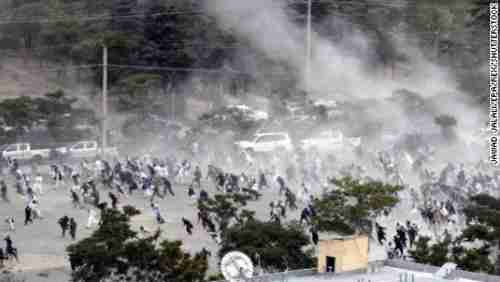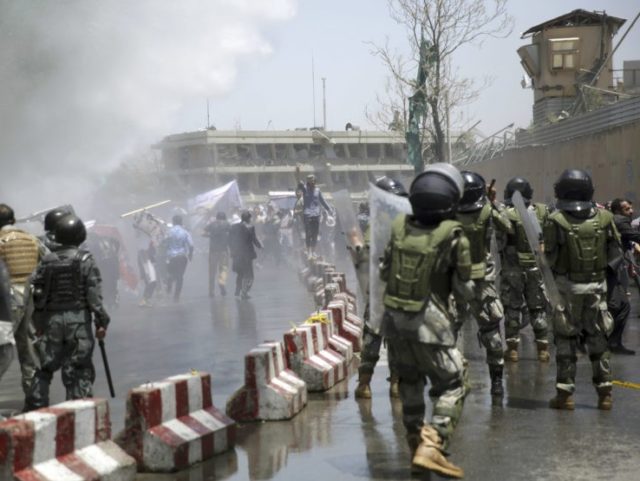This morning’s key headlines from GenerationalDynamics.com
- Three suicide bombers target Kabul Afghanistan funeral for previous victims
- Afghanistan seethes with renewed anger over the attacks
Three suicide bombers target Kabul Afghanistan funeral for previous victims

Mourners in Kabul run for safety Saturday after an explosion at a funeral (CNN)
Six people were killed and 87 wounded in coordinated suicide bombing explosions at three sites in Kabul, Afghanistan, on Saturday, targeting a funeral for Mohammad Salim Izadyar. Other reports indicate that as many as 20 people were killed.
Izadyar was among six people killed and dozens injured on Friday by Afghan security forces during anti-government demonstrations.
The demonstrators were demanding the resignation of Afghanistan’s president Ashraf Ghani for failure to protect the people, following a huge truck bombing on Wednesday that kill 100 people and injured hundreds more.
President Ashraf Ghani made a televised appeal for national unity:
The country is under attack. We must stay strong and united…
Terrorist groups plot to sow chaos. Their aim is to create poor governance and disorder in communities. We must not let ourselves fall into the trap that the enemies have brought to our country.
No one has claimed credit for either Wednesday’s attack or Saturday’s attack. Nonetheless, it is widely believed that the Taliban were responsible, particularly the Haqqani Network, but that neither wants to take credit because of the massive carnage of civilians, contrary to the Taliban’s cultivated image of wonderful people merely fighting the infidels in the US and Nato. Khaama Press (Kabul) and Tolo News (Kabul) and CNN
Related Articles
- Kabul bombing brings back memories of bloody 1990s Afghan civil war (03-Jun-2017)
- Massive terror explosion in Kabul, Afghanistan, as US considers sending more troops (01-Jun-2017)
- Terrorist bombing of Kabul hotel shows power of Haqqani network (30-Jun-2011)
Afghanistan seethes with renewed anger over the attacks
Kabul, Afghanistan, has now had three deadly incidents in four days, killing hundreds of people and injuring many hundreds more. People are seething with anger at the Ashraf Ghani government.
Wednesday’s and Saturday’s attacks took place in what are supposed to be the most secure parts of Kabul. Friday’s victims were killed by the government security forces. It’s clear that no one is immune to the rising violence in the city. Kabul was once considered the most secure part of Afghanistan, but now it seems to be the most dangerous.
As we described yesterday, the attacks on Wednesday and Friday are bringing back memories of Afghanistan’s bloody civil war of 1991-96. That war was fought between the Pashtuns in southern Afghanistan versus the Northern Alliance of Tajiks, Hazaras and Uzbeks in northern Afghanistan.
That same ethnic split divided the two sides in Afghanistan during the 2001 Afghan war, where the US attacked the Taliban, with the help and support of Afghanistan’s Northern Alliance.
Saturday’s funeral was for Salim Izadyar. He is the son of Mohammad Alan Izadyar, the deputy speaker of the Afghan senate and former Northern Alliance warlord who fought against the Taliban in 2001. Many of the people attending the funeral were honoring Salim, as well as his father. It seems likely that the Taliban were targeting the funeral guests for that reason.
Another person attending the funeral was Abdullah Abdullah, the Chief Executive of Afghanistan. In 2014, at US Secretary of State John Kerry’s suggestion, Abdullah and Ghani became “co-presidents” of a sort.
The intention was to resolve a continuing governmental crisis at the time, but an analyst, Baker Atyani, says that the chaos caused by this co-presidency is leading to power struggles within the Afghan government, and that is leading to the violence. Ghani is a Pashtun while Abdullah is of mixed Pashtun-Tajik heritage, having supported the Northern Alliance.
As we wrote yesterday, Afghanistan is entering a generational Awakening era, and this ethnic violence will only increase. The two sides that respectively became the Taliban and the Northern Alliance ended their war in 1996. Those people are at peace, but their children are not.
The dilemma for the US and for that Nato coalition fighting in Afghanistan is how to extricate themselves. The US is still policeman of the world, and completely abandoning Afghanistan would be viewed as similar to the Chicago police force completely abandoning South Chicago because the fighting cannot be stopped. Unfortunately, the alternative is remaining in Afghanistan, even increasing the number of troops, even though there will never be peace between the Taliban and the Northern Alliance. France 24 and BBC and Arab News and National Interest
Related Articles
- Pak-Afghan border crisis revives controversy over 120 year old Durand Line (19-Jun-2016)
- In a reversal, Obama allows US troops in Afghanistan in combat roles (11-Jun-2016)
- Turkmenistan fears jihadist invasion from Afghanistan (02-Apr-2015)
- The Afghanistan elections and the Afghan-Pakistan Taliban alliance (13-Apr-2014)
KEYS: Generational Dynamics, Kabul, Afghanistan, Mohammad Salim Izadyar, Mohammad Alan Izadyar, Ashraf Ghani, Abdullah Abdullah, Taliban, Haqqani Network, Pashtuns, Northern Alliance, Baker Atyani
Permanent web link to this article
Receive daily World View columns by e-mail

COMMENTS
Please let us know if you're having issues with commenting.